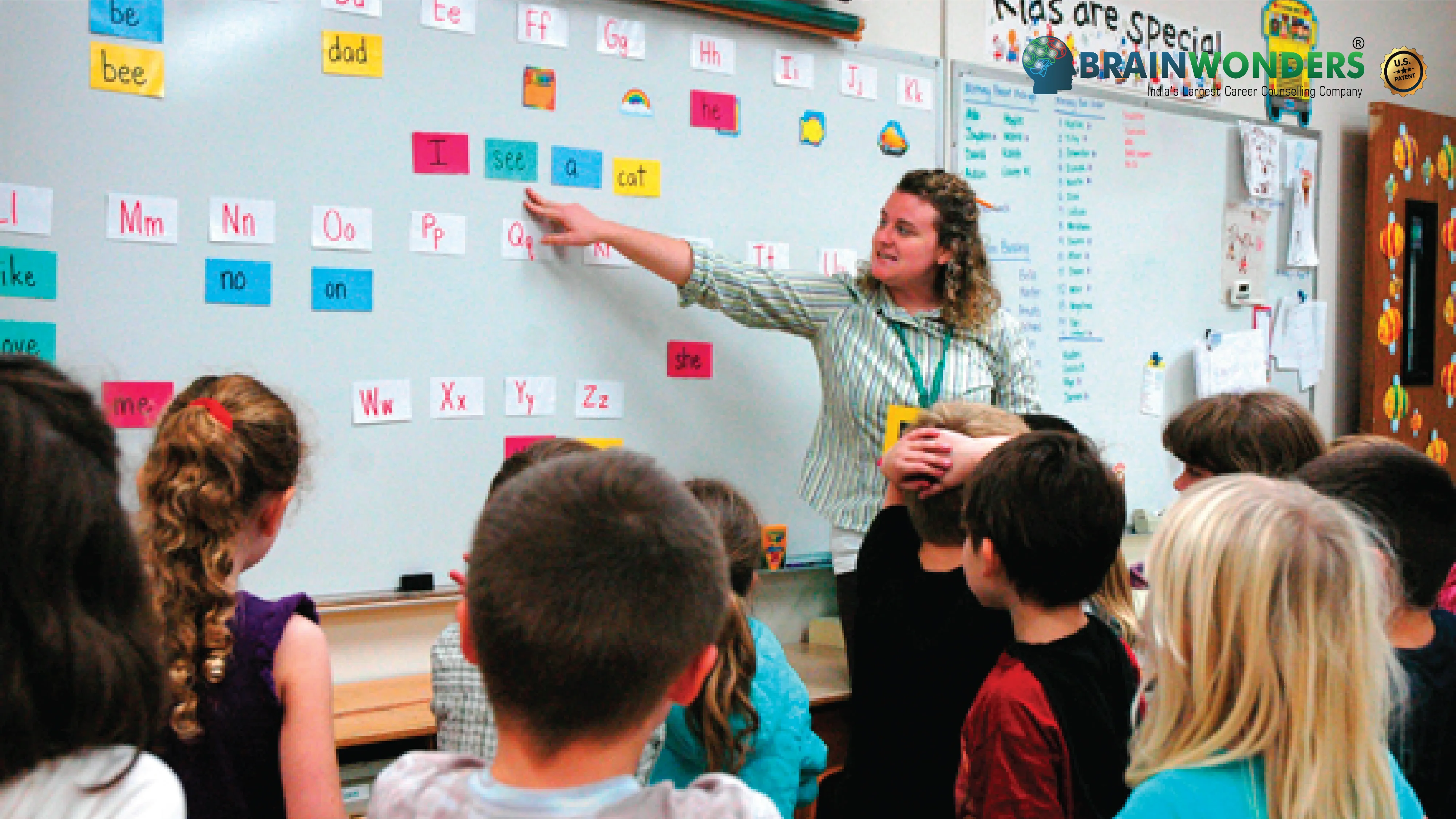How to become a Secondary School Teacher
Overview, Courses, Exam, Colleges, Pathways, Salary

Overview
Who is Secondary School Teacher ?
Secondary school teachers are efficiently qualified for educating students ranging from classes 6th to 12th. They help equip children for their bright future by focusing on their problem-solving skills, critical thinking methods as well as basic concepts of different subjects they teach. They use proven teaching methods to teach students the classroom curriculum that is essential for clearing exams and getting into the next grade. They are also expected to create a positive environment in a classroom that is both disciplined and relaxed. The profession in itself is the most challenging one at the same time providing a great amount of satisfaction. It requires expertise, skills and specific qualities to offer personalized assistance to fulfil individual as well as societal needs. they support the students in reaching their aims and help them get through with all the struggles they face. Their primary aim is to train and prepare the students for their future college life along with sufficiently equipping them for the job market. They ordinarily teach using classroom discussions and lecture methods along with additional aids that come in handy like audiovisual assistants.
Typical day at work
What does Secondary School Teacher do?
The core responsibilities of a secondary school teacher are:
- They must teach through lecture method, discussions and illustrations in one or more subjects along with formulating course materials like syllabus, assignments, homework etc.
- They need to manage, accumulate and grade the tests along with allotting work to others. They also counsel students and assist them with their queries.
- They must keep themselves theoretically updated and initiate discussions on relevant topics to help advance a better understanding of the subject.
- They are expected to set explicit goals for each topic, unit or section and deliver those goals to students while explaining.
- They need to plan and carry out projects to equip students with opportunities to observe, inquire and investigate the subject.
- They are expected to see parents and guardians discuss the growth of their children.
- They work in cooperation with other teachers and leaders to plan, assess and improve high school programmes that give better support to their future.
- They are required to keep student records accurate and updated including report making on children and events for future references.
- They need to direct and counsel students with adjustment problems or scholastic matters or at times special academic interests.
Abilities and Aptitude needed
What are the skills, abilities & aptitude needed to become Secondary School Teacher?
A secondary school teacher needs some key competencies during their teaching practice. These include great communication skills, presentation abilities, holding discussions and being well versed with tools of education. They are required to be good readers as they must readily enhance their knowledge and skills over a period of time and have the most enhanced knowledge of the subject. They need great control over the language so that it is easier for the students to understand the subject taught. They must have all the information about the beliefs and methods for developing and planning the curriculum. They must be well versed in using technology to help incorporate it with their syllabus. They must focus on making the subject matter more easily accessible to the students be it in the theoretical lectures or practical demonstrations. They must also be aware of various teaching approaches so as to help students on different individual levels.
Salary
Salary for Secondary School Teacher?
Salary for Secondary School Teachers in India:
- Minimum Monthly Salary: For entry-level Secondary School Teachers or those with limited experience, the monthly salary might be around INR 25,000 to INR 35,000.
- Maximum Monthly Salary: Highly experienced and senior-level Secondary School Teachers, especially those working in reputed schools or with additional qualifications, may earn a maximum monthly salary ranging from INR 50,000 to INR 1 lakh or more.
- Annual Salary: The annual salary for entry-level Secondary School Teachers could be approximately INR 3 lakhs to INR 4.2 lakhs per year. Experienced and successful Secondary School Teachers may earn a maximum annual salary ranging from INR 6 lakhs to INR 12 lakhs or more.
- Highest Paying Jobs and Scope: The highest paying jobs for Secondary School Teachers in India are typically with prestigious private schools, international schools, and well-established educational institutions. Secondary School Teachers who teach specialized subjects, have advanced degrees, or take on additional responsibilities within the school may command higher salaries and benefits. The career scope for Secondary School Teachers in India is promising, as education is a fundamental sector, and there is a continuous demand for skilled and passionate teachers who can provide quality education and guidance to students. With the growing focus on educational reforms and advancements in teaching methodologies, the role of Secondary School Teachers remains essential in shaping the country's future.
Pathways
How to become an Secondary School Teacher?
Entrance Exam
Entrance Exam for Secondary School Teacher ?
Courses
Which course I can pursue?
Best Colleges
Which are the best colleges to attend to become an Secondary School Teacher?
Industries
Which Industries are open for Secondary School Teacher?
Secondary school teachers are in demand in various industries that encompass educational institutions catering to students in the secondary level (usually grades 9 to 12). Here are some of the industries open for secondary school teachers:
- Public Schools: Teachers are employed in public schools funded and run by government authorities. These schools follow the national or state curriculum.
- Private Schools: Private schools offer an alternative to public education and may have different curricula, teaching methodologies, or specializations.
- International Schools: International schools provide education following an international curriculum (e.g., International Baccalaureate) and cater to students from diverse cultural backgrounds.
- Charter Schools: Charter schools operate independently but are publicly funded. They often have a specific focus or theme, such as arts, science, or technology.
- Boarding Schools: Boarding schools provide accommodation and education to students, and teachers may have a more immersive role in their students' lives.
- Religious Schools: Schools affiliated with religious organizations follow a curriculum that incorporates religious teachings and values.
- Special Education Schools: These schools cater to students with special needs and require teachers with expertise in special education.
- Homeschooling: Some parents choose to homeschool their children, and teachers may offer private tutoring or online teaching services for such students.
- Online Education Platforms: With the rise of online education, teachers may find opportunities to teach secondary school subjects through virtual platforms.
- Vocational and Technical Schools: Schools that focus on vocational training or technical education may require teachers with expertise in specific fields.
- International Education Programs: Schools offering international education programs or exchange programs may require teachers with multicultural awareness and experience.
- Language Institutes: Language institutes may require teachers for teaching foreign languages or English as a second language.
internship
Are there internships available for Secondary School Teacher?
Internships for Secondary School Teachers can provide valuable practical experience and insights into the teaching profession. While traditional internships for teachers may not be as common as in some other fields, there are still opportunities available for aspiring educators to gain hands-on experience in schools. Here are some avenues to explore for secondary school teacher internships:
- Student Teaching Programs: Many teacher education programs include a student teaching component, where aspiring teachers work as interns in secondary schools under the guidance of experienced mentor teachers.
- Teaching Fellowships: Some organizations and non-profit institutions offer teaching fellowships that allow individuals to work as interns in secondary schools while receiving additional training and support.
- Education Departments: State or local education departments may have internship programs for aspiring teachers, allowing them to gain experience in public schools.
- Charter Schools: Charter schools often offer internships and teaching assistant positions for individuals interested in pursuing a career in education.
- Private Schools: Some private schools may have internship or volunteer opportunities for individuals seeking to gain teaching experience.
- Education Non-profits: Non-profit organizations focused on education, and youth development may offer internships in schools or after-school programs.
- Substitute Teaching: While not a traditional internship, substitute teaching can provide aspiring teachers with practical classroom experience and exposure to the school environment.
Career outlook
What does the future look like for Secondary School Teacher?
A secondary school teacher can be employed in any private or public schools on a PAN India level. They help improve a student's social, emotional, intellectual and physical development by focussing on their overall development. The school size, as well as classroom strength, depends on many different factors such as the state, its population, urban or rural background, dropout rates, etc. The employment of a high school teacher is predicted to grow at a rate of 4 per cent from 2019 to 2029, this is about as speedy as the standard occupations in the country. Most government and semi-government based schools provide benefits of job security, whereas in the private sector only a few positions are fixated and that too on a contractual basis for a limited time period.







